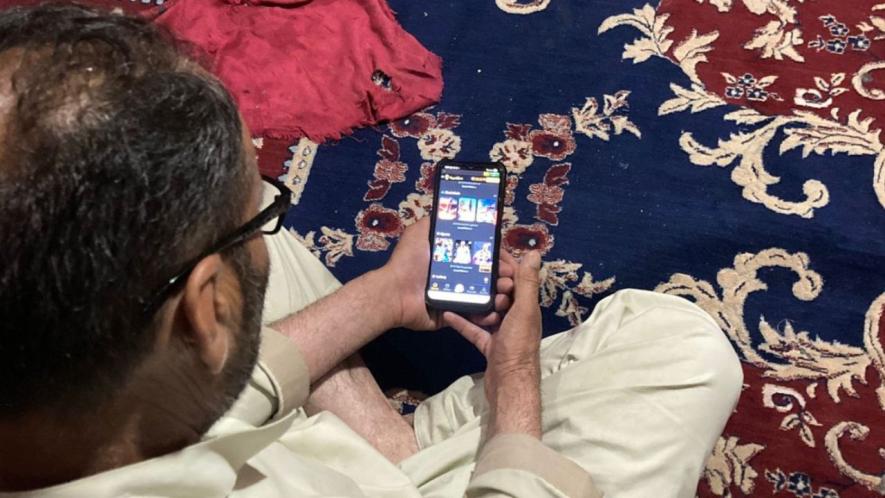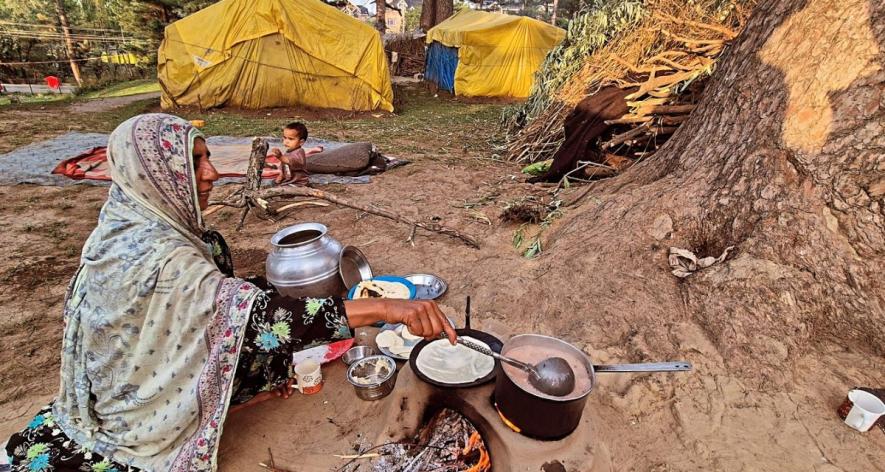Kashmir: How a Whatsapp Rumour Left Baramulla Residents With Broken Bones, Empty Wallets

With smartphones in every household, rumour spreads very easily (Photo - Arsalan Bukhari, 101Reporters).
Baramulla, Jammu and Kashmir: In late 2019, a strange rumour began to sweep through villages in the Pir Panjal range. WhatsApp forwards claimed that when lightning struck, it left behind rare “sky stones” worth lakhs, sometimes as much as Rs 50 lakh each to Chinese buyers.
The messages came as grainy videos, voice notes, and photos of glowing stones, often with dramatic music and captions saying the National Aeronautics and Space Administration (NASA) or China was involved. “It sounded like science, but it was complete nonsense,” said Bilal Ahmad (34) a science teacher. Most villagers didn’t have the scientific background to fact-check the claims.
With smartphones in nearly every household and data packages getting cheaper, the rumour spread quickly, especially among younger men without steady work. The chase it sparked was fuelled by desperation and shaped by a wildfire of digital misinformation.
“It was December 2019. I still remember the day clearly,” said Aslam Khan, a farmer in his late 40s, sitting inside his modest two-room home. “Someone sent a video on WhatsApp that said lightning leaves behind special stones. And they were worth lakhs.” Soon, men were racing into freshly struck fields and hillsides, digging with shovels or bare hands in hopes of striking treasure.
Chasing treasures
In 2022, Junaid (26) from Khaipora fell from a rocky ledge while running toward a lightning site. He fractured his arm and spent nearly Rs 30,000 on treatment, more than a month’s income for his family. Another man, Furqan Wani, suffered burns while digging in warm soil.
“We live in a tin shed, me, my mother, and my two brothers,” Furqan told 101Reporters. “There’s no steady work here… When a friend told me about the lightning stones, it felt like a way out. That evening, a strike hit nearby. I ran to the spot, too fast to think clearly. I just had this fear, what if someone else found it before me? So I started digging with my bare hands.”
Majid Bashir even borrowed Rs 15,000 to buy a metal detector, hoping to find the stones. Nothing turned up, and the relationship with the lender soured. “I lost more than just money,” said Khan. “I stopped going to the orchard for two weeks, running after something that wasn’t even real. My wife was angry. My children kept asking why I was never home.”
Daily life in the village began to unravel. Men skipped work and, in some cases, pulled children out of school to help in the search. A few tried selling ordinary rocks as rare finds, leading to small-scale fraud and mistrust among neighbours.
Baramulla, like many parts of rural Kashmir, has limited economic opportunities. Those who aren’t farmers rely on tourism, government contracts, or migrate seasonally for labour. The few jobs that do exist in construction, security, or transport are often temporary. Many of those who fell for the myth were jobless, underemployed, or drowning in loans.
“The biggest reason I believed was not the stone, it was the situation I was in,” says Junaid. “Even if there was a 1% chance it was true, I had to try.”
Sensing an opportunity, local fraudsters stepped in. Several villagers said they were approached by self-proclaimed “buyers” or “stone testers” who charged hefty fees to authenticate stones or connect them with supposed international clients. None of the deals materialised.

Baramulla, like many parts of rural Kashmir, has limited economic opportunities (Photo - Arsalan Bukhari, 101Reporters)
“The whole village went mad,” Aslam said. “But honestly, that’s not surprising in a place where people are poor and unemployed. We were all hoping for a miracle.”
Fighting back with facts
By 2021, Ahmad had seen enough. “I heard one of my students say his uncle found a lightning stone,” he recalls. “I knew it wasn’t just a rumour anymore. It had become a belief system.”
Over time, some villagers began to realise the stones weren’t what they had imagined. But the hope lingered. “Deep down, many still believe maybe one day…” said Ahmad.
In the home of Habib Khan (70), this belief system still has a place. “IT is absolutely correct. My father used to collect these stones,” he said. “People don’t find them now because they are not pure, they do sins. The place must also be clean.” Similar theories, repeated by elderly men and women, have kept the myth alive and with it the scams going.
In 2021, Ahmad began inviting a few villagers to evening meetings at the school where he teaches. Using a blackboard, he explained how lightning forms, why it doesn’t leave stones, and how electricity flows through soil. That first gathering became the seed for what is now called the “storm safety circle”.
Since then, these informal meetings have spread to three nearby villages, held in schoolyards, panchayat offices, or community halls. “We use whatever we can, projectors, printed photos, even toy models, to explain the science,” Ahmad says. “Sometimes NGOs that promote digital literacy help us, but mostly, it’s just us.”
The sessions also show images of fulgurites, natural glass tubes formed when lightning strikes sand, to illustrate how some of the visuals in viral videos were real objects misused to spread lies. Ahmad and his volunteers use local examples, injuries, lost income, and family conflicts, to make the point. “The idea isn’t to humiliate believers,” he said. “It’s to help them reflect. People trust stories, so we use real ones to bring them back to reality.”
Ironically, the same digital tools that spread the myth are now helping dismantle it. Ahmad’s team creates short explainer videos in Kashmiri and Urdu, using simple animations and voiceovers for WhatsApp. Some feature villagers who stopped believing; others show children explaining lightning in their own words.
“We made one video of a boy asking his grandfather why he thinks a stone would fall from the sky,” says Zahid (19), a volunteer. “It made people laugh, but it also made them think.”
In one village, loudspeakers are used after evening prayers to broadcast safety messages during storm season. While the number of “storm chasers” has dropped, Ahmad warned the work is far from done.
“The lightning rumour was just one example,” he said. “We’ve also seen fake job offers, miracle seeds, and communal hate. The bigger problem is no access to verified information and too much trust in WhatsApp.”
Ahmad now hopes to turn the storm safety circles into broader digital literacy clubs, training volunteers in each village to counter future waves of misinformation about health, elections, or government schemes. His group has approached a Srinagar-based nonprofit for support and is drafting a curriculum for schools.
Funding, however, remains a hurdle. “We can’t do this forever,” Ahmad said. “We need a way for the community to carry it forward.”
Still, the impact is real. In Khan’s village, the stone-chasing days are gone. Children are back in school. Farmers are in their orchards. The only people watching the sky now are the ones checking if rain will damage their crops—not if it will drop treasure.
“It wasn’t the storm that was hurting us,” Khan says quietly. “It was what we believed about it.”
Arsalan Bukhari is a freelance journalist and a member of 101Reporters, a pan-India network of grassroots reporters.
Get the latest reports & analysis with people's perspective on Protests, movements & deep analytical videos, discussions of the current affairs in your Telegram app. Subscribe to NewsClick's Telegram channel & get Real-Time updates on stories, as they get published on our website.
























